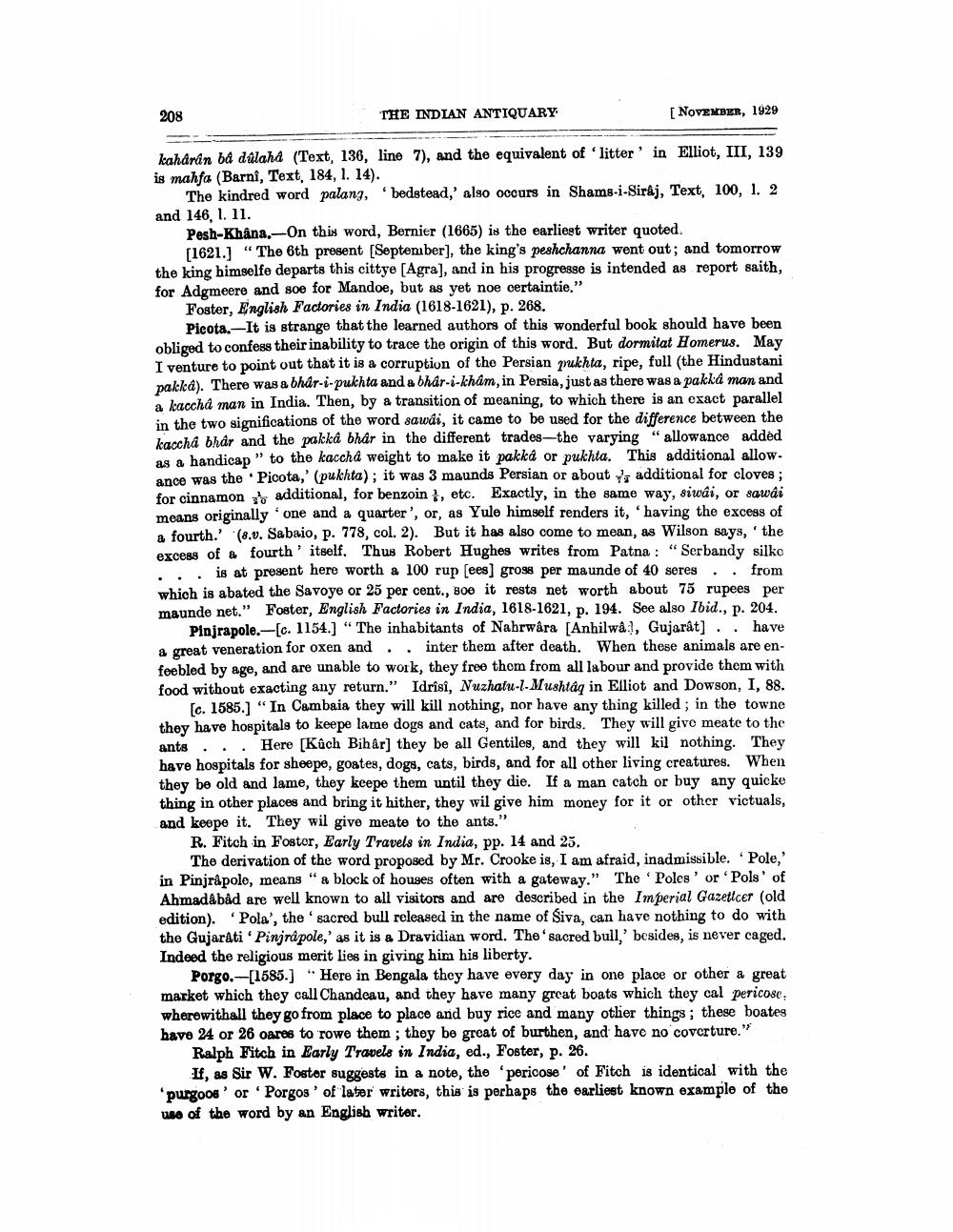________________
208
THE INDIAN ANTIQUARY
[ NOVEMBER, 1929
kahanin bå důlaha (Text, 136, line 7), and the equivalent of litter' in Elliot, III, 139 is mahfa (Barnî, Text, 184, 1. 14).
The kindred word palang, 'bedstead,' algo occurs in Shams-i-Siraj, Text, 100, 1. 2 and 146, 1. 11.
Pesh-Khâna. On this word, Bernier (1665) is the earliest writer quoted.
[1621.) “The 6th present [September], the king's peshchanna went out; and tomorrow the king himselfe departs this cittye (Agra), and in his progresse is intended as report saith, for Adgmeere and soe for Mandoe, but as yet noe certaintie."
Foster, English Factories in India (1618-1621), p. 268.
Picota.-It is strange that the learned authors of this wonderful book should have been obliged to confess their inability to trace the origin of this word. But dormitat Homerus. May I venture to point out that it is a corruption of the Persian pukhta, ripe, full (the Hindustani palka). There was a bhar-i-pukhta and a bhdr-i-khâm, in Persia, just as there was a pakka man and a kacchå man in India. Then, by a transition of meaning, to which there is an exact parallel in the two significations of the word sawái, it came to be used for the difference between the kaccha bhar and the pakkâ bhår in the different trades--the varying "allowance added as a handicap" to the kacchd weight to make it pakka or pukhta. This additional allow. ance was the Picota,' (pukhta); it was 3 maunds Persian or about Yo additional for cloves; for cinnamon z' additional, for benzoin , etc. Exactly, in the same way, siwai, or sawai means originally one and a quarter', or, as Yule himself renders it,'having the excess of a fourth.' (8.0. Sabaio, p. 778, col. 2). But it has also come to mean, as Wilson says, 'the excess of & fourth' itself. Thus Robert Hughes writes from Patna : "Serbandy silke ...is at present here worth a 100 rup (ees) gross per maunde of 40 seres .. from which is abated the Savoye or 25 per cent., 800 it rests net worth about 75 rupees per maunde net." Foster, English Factories in India, 1618-1621, p. 194. See also Ibid., p. 204.
Pinirapole.-c. 1154.] "The inhabitants of Nabrwâra [Anhilwa), Gujarat] .. have a great veneration for oxen and .. inter them after death. When these animals are enfeebled by age, and are unable to work, they free them from all labour and provide them with food without exacting any return." Idrisi, Nuzhatu-l-Mushtaq in Elliot and Dowson, I, 88.
[c. 1585.) "In Cambaia they will kill nothing, nor have any thing killed; in the towne they have hospitals to keepe lame dogs and cats, and for birds. They will give meate to the ants. . . Here [Kûch Bihár) they be all Gentiles, and they will kil nothing. They have hospitals for sheepe, goates, dogs, cats, birds, and for all other living creatures. When they be old and lame, they keepe them until they die. If a man catch or buy any quicke thing in other places and bring it hither, they wil give him money for it or other victuals, and keepe it. They wil give meate to the ants."
R. Fitch in Fostor, Early Travels in India, pp. 14 and 25.
The derivation of the word proposed by Mr. Crooke is, I am afraid, inadmissible. "Pole,' in Pinjråpolo, means "a block of houses often with a gateway." The 'Poles' or 'Pols' of Ahmadâbâd are well known to all visitors and are described in the Imperial Gazettcer (old edition). Pola', the sacred bull released in the name of Siva, can have nothing to do with the Gujarati 'Pinjra pole,' as it is a Dravidian word. The sacred bull,' besides, is never caged. Indeed the religious merit lies in giving him his liberty.
Porgo.-[1585.) "Here in Bengala they have every day in one place or other a great market which they call Chandeau, and they have many great boats which they cal pericose, wherewithall they go from place to place and buy rice and many other things; these boates have 24 or 26 oares to rowe them; they be great of burthen, and have no coverture."
Ralph Fitch in Early Travels in India, ed., Foster, p. 26.
If, as Sir W. Fostor suggests in a note, the pericose' of Fitch is identical with the purgoos' or 'Porgos' of later writers, this is perhaps the earliest known example of the us of the word by an English writer.




